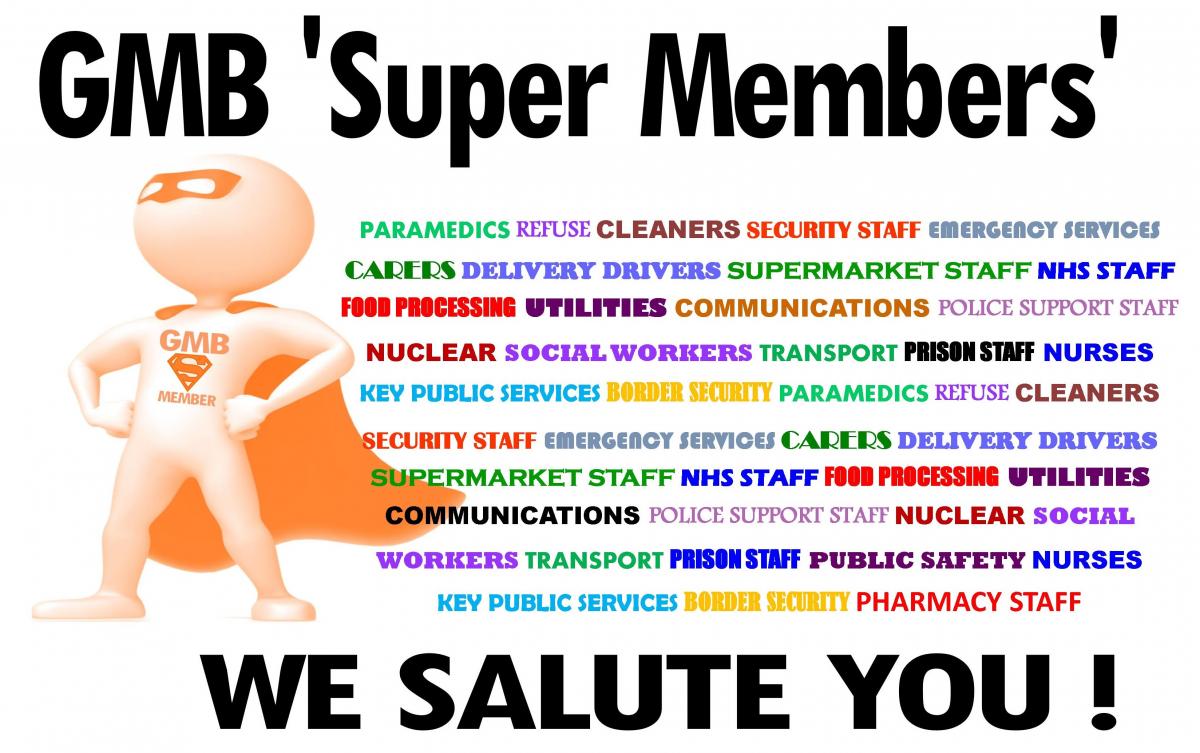Knowsley Council Update - Please find below Knowsley Council’s new HR Policy in relation to ‘High-Risk Medical Conditions’ & Other useful Information
The policy takes immediate effect. It has been discussed with GMB and the other Single Status unions and is broadly supported. Please take time out to read the policy which is below.
If you have already taken time off work to self-isolate, then the declaration will need to be completed retrospectively and review arrangements put in place from next week onwards.
HR will shortly be creating an additional HR Resources page on Bertha, specifically containing Coronavirus management resources; policies, procedures, guidance, etc. The link to this page will be circulated early next week
Paul Richards has contacted HR and informed them that not everyone has access to BERTHA so they need to get information out to workplaces ETC to keep staff updated. we can inform you this has now been agreed.
Coronavirus – Human Resources Policy Emergency Provisions (2)
All employees are expected to familiarise themselves with the latest Coronavirus information on a regular basis from either Public Health England, the Government or Knowsley Council.
This document sets out further emergency provisions in respect of Council policies and procedures and provides additional guidance about dealing with high-risk medical conditions that may prevent an employee from working normally. These emergency provisions only apply in respect of absences or time off relating to Coronavirus. In all other instances, the agreed Council policies will remain in place.
This Policy will be made available to employees who do not have access to Bertha. Managers are expected to circulate this information using existing communication methods and particularly for employees working from alternative workplaces (including their home).
High-Risk Groups
Government advice defines this group as people who are:-
• Aged 70 or older (regardless of whether they have medical conditions);
• Pregnant; or,
• Aged under 70 with any of the underlying health conditions listed below (i.e. anyone who is instructed to get a flu jab as an adult each year on medical grounds):-
o Chronic (long-term) respiratory diseases, such as asthma, chronic obstructive pulmonary disease (COPD), emphysema or bronchitis;
o Chronic heart disease, such as heart failure;
o Chronic kidney disease;
o Chronic liver disease, such as hepatitis;
o Chronic neurological conditions, such as Parkinson’s disease, motor neurone disease, multiple sclerosis (MS), a learning disability, or cerebral palsy;
o Diabetes;
o Problems with your spleen – for example, sickle cell disease or if you have had your spleen removed;
o A weakened immune system as the result of conditions such as HIV and AIDS, or medicines such as steroid tablets or chemotherapy; and/or,
o Being seriously overweight (a body mass index (BMI) of 40 or above).
There are some clinical conditions, which put people at even higher risk of severe illness from Coronavirus. If you are in this category, NHS England have made arrangements to contact you directly with advice. In any event, you should rigorously follow social distancing advice provided by the Government and PHE. People falling into this group are those at particular risk due to complex health problems, such as:-
• People who have received an organ transplant and remain on ongoing immunosuppression medication;
• People with cancer who are undergoing active chemotherapy or radiotherapy;
• People with cancers of the blood or bone marrow (such as leukaemia) who are at any stage of treatment;
• People with severe chest conditions such as cystic fibrosis or severe asthma (requiring hospital admissions or courses of steroid tablets); and,
• People with severe diseases of body systems, such as severe kidney disease (dialysis).
If you are in a high-risk group you should take a particularly stringent approach to the following “social distancing” measures (steps to reduce social interaction between people):-
• Avoiding contact with people displaying symptoms of Coronavirus (high temperature and/or a new and continuous cough);
• Avoiding non-essential use of public transport, and varying your travel times to avoid rush hour if possible;
• Working from home where possible;
• Avoiding large gatherings and avoiding public spaces, such as pubs, cinemas, restaurants, theatres, bars, and clubs;
• Avoiding gatherings with friends and family, and instead keeping in touch through remote technology, such as phone, internet, and social media;
• Using telephone or online services to contact your GP or other essential services;
• Everyone should seek to stop non-essential contact with others and unnecessary travel by following the advice above around home working.
Employees who live with family members with high-risk medical conditions, where the risk of cross infection is potentially more serious should, where necessary, talk to their line manager about the provisions set out in this procedure. Human Resources, Health and Safety or Public Health advice should be obtained as necessary.
Working Arrangements for Employees with High-Risk Medical Conditions
Homeworking; Following Government advice, homeworking will be implemented for all those employees who are set up to work from home, including those with high-risk medical conditions, where the threat of Coronavirus infection must be minimised. Employees should contact their line manager to discuss this, ensuring that any required equipment is made available. Homeworking must not be at the detriment of the service or current service business continuity plans.
Where it is agreed that an employee can work from home under these provisions, health and safety advice will be provided to ensure that there is adequate working space and electrical safety to enable work to be undertaken safely, without endangering the health of the home worker or their family. Separate risk-assessment guidance on home working is now available.
Redeployment onto Alternative Duties; In the event of the Coronavirus reaching a point where staffing levels are significantly affected or where an employee with a high-risk medical condition cannot have their duties modified in such a way as to eliminate or significantly red
In any event, alternative duties will be discussed with the employee first and where possible, adequate notice given. In some instances, homeworking agreements may be terminated in order to allow the Council to redirect staff onto other priority work.
In relation to an employee with a high-risk medical condition, it will be necessary for the manager to assess how health protection and social distancing measures can be applied. Health protection measures include an initial assessment to ensure the employee’s high-risk medical condition is not likely to be adversely affected by the alternative duties, any additional training that might be necessary and any required personal, protective equipment.
Any manager considering alternative duties for an employee with a high-risk medical condition should consult Human Resources and Health and Safety Managers for advice. HR will assist the manager in determining whether Occupational Health advice should be obtained.
Approved Absence from Work
Where, following an assessment of individual circumstances, it is determined that home working is not available and suitable alternative duties cannot be identified, the manager must consider removing the high-risk employee from the workplace. In these circumstances, the employees may be sent home until further notice.
If this happens, the employee must be contactable during their normal hours of work and may be required to discuss their circumstances during a review with their manager. Such a review would normally be undertake over the telephone, unless alternative facilities are available, i.e. video conferencing. The review will take into account any change in medical advice that may affect the approved absence and any change in working arrangements that might allow home working or alternative duties to commence. The approved absence will be terminated as soon as reasonably practicable.
An approved absence will not be treated as a sickness absence (see later *note) and the employee will continue to receive their normal, full pay during the approved absence from work. In the event that the current emergency arrangements do not allow average full pay to be calculated and applied immediately, the Council will make arrangements for the employee’s pay to be made up at the earliest opportunity. In these circumstances, the pay during the initial stages of the approved absence will be no less than the employee’s basic contractual salary.
Certifying the High-Risk Medical Condition
If an employee requests to be sent home under the arrangements set out in this procedure or this decision is taken by the manager in consultation with the employee, the document at the appendix to this procedure (‘Certifying an Employee as Unable to Work due to a High-Risk Medical Condition’) must be completed and signed. Once completed and signed the document should be retained by the manager but also emailed to Employee.RelationsTeamDCR@knowsley.gov.uk. The document should also be used to record any consideration given by the manager to home working, alternative duties or health protection measures.
The Council considers that it is reasonable to require high-risk employees to provide evidence of relevant medical conditions. If evidence is not immediately available (e.g. letter, appointment card, or NHS high-risk medical status communication) and given the pressures on the NHS, the Council may allow medical evidence to be produced at a later date, for example when the approved absence is reviewed. The Council will cover the cost of any required medical evidence. If necessary, the manager should seek advice from Human Resources or Occupational Health about the employee’s medical condition and working arrangements.
*Where the employee is unable to provide sufficient medical evidence about the high-risk medical condition, but the employee is unable to work as a result of this condition, the Council reserves the right to treat the absence as sickness absence, in which case the Council’s normal sickness absence management policy will apply.
Additional Advice
For further advice on the application of these provisions, including other employment categories such as Agency and Casual Workers, managers should contact the Employee Relations team at Employee.RelationsTeamDCR@knowsley.gov.uk.
The emergency provisions set out in this document have been shared with the Single Status trade unions (Unison, GMB and Unite the Union) and will be reviewed regularly based on the prevailing circumstances.
Knowsley Metropolitan Borough Council
March 2020
Paul Richards- Branch Secretary- 07810053154 /0151 477 8983
Email: paul.richards@gmbactivist.org.uk
Danny Burns-Branch-President & YOS-07770 703577
Email: danny.burns@knowsley.gov.uk
Mike Bowden-Street Scene-07769 820396 / 0151 477 8985
Email: M.Bowden@outlook.com
Karen Hardwick-Schools-0151 477 8710 / 0151 477 8984
Email: k.hardwick@kirkbyhighschool.net
Jackie Weller-Family First-0151 443 2882
Email: Jackie.Weller@knowsley.gov.uk
Gemma McGreevy- Family First-0151 443 5054
Email: gemma.mcgreevy@knowsley.gov.uk
Danny Crew-Parks & cemeteries-07851 074229
Email: gmbdanc@gmail.com
Mike Newcomb- Waste Services- 07776451585
Email: mikenew909@gmail.com
Branch Address
GMB, Tower Hill Primary Care Centre
Ebony Way, Kirkby, Liverpool L33 1XT
Merseyside-L33 7XB



